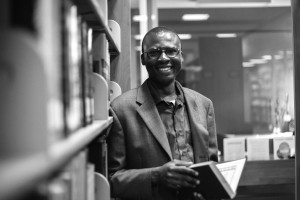 I have four major research interests: social and political theory; the rhetoric of knowledges; meta-ethical and ethical inquiry; and aesthetic theory and criticism. My work in social and political theory is concerned with three questions. The initial question begins with trying to understand the ontology of societies. That is, what precisely constitutes “society”? What do we mean when we speak of “ecology,” “politics,” “economics” and “culture”? How are these constituted in and through time (“History”) and space (“Geography”). Second, I am interested in understanding how human agency is emergent from and constitutive of ecological and structural formations. My questions in this vein focus on the meanings and limits of agency, subjectivity, and ideology. Third, I am interested in exploring the question of social normativity. My reading and research has sought to re-explore questions to do with the (im)possibilities of utopia.
I have four major research interests: social and political theory; the rhetoric of knowledges; meta-ethical and ethical inquiry; and aesthetic theory and criticism. My work in social and political theory is concerned with three questions. The initial question begins with trying to understand the ontology of societies. That is, what precisely constitutes “society”? What do we mean when we speak of “ecology,” “politics,” “economics” and “culture”? How are these constituted in and through time (“History”) and space (“Geography”). Second, I am interested in understanding how human agency is emergent from and constitutive of ecological and structural formations. My questions in this vein focus on the meanings and limits of agency, subjectivity, and ideology. Third, I am interested in exploring the question of social normativity. My reading and research has sought to re-explore questions to do with the (im)possibilities of utopia.
A second related major research interest is on the rhetoric of knowledges. The rhetoric of knowledges is a form of inquiry that is emergent at the intersection of intellectual history, the sociology of knowledge, and rhetorical habitus. If intellectual history offers a mapping of the trajectories and contours of ideas, and the sociology of knowledge is responsive to the circulation of power in knowledge articulation – that is, how knowledge is inflected by class, gender, race, sexuality, disability, and so on – an attentiveness to rhetorical habitus aims at conveying a sense of the texture of intellectual sensibility, the taste or savoriness of knowledge. As Susan Sontag has pointed out in a different context, “the sensibility of an era is not only its most decisive, but also its most perishable aspect. One may capture the ideas (intellectual history) and the behavior (social history) of an epoch without ever touching upon the sensibility or taste which informed those ideas, that behavior.” (Susan Sontag, “Notes on Camp”). It is precisely this intersection of intellectual history, the sociology of knowledges and critical habitus that I have been interested in mapping and inhabiting in my reading, writing, and teaching.
Third, my writing and reading has increasingly worried over the possibilities of a meta-ethical narrative that is robustly informed by the deliverances of the best of our natural sciences – for example, that we are biological beings that have evolved – and does justice to our social embeddedness. Insofar as I would argue that meta-ethics is only intelligible if it takes seriously creaturely embeddedness and social relationships, I am increasingly convinced that the proof of the meta-ethic is only to be found in the nutritional value of its normative ethical fruits. Toward that end, I aim to test my intuitions on a range of meta-ethical concerns on the rough ground of contemporary debates in the public sphere.
Fourth, I am interested in aesthetic history, theory and criticism. Specifically, I have been exploring aesthetic theories that evince polyphonic and contrapuntal movements in at least two frequencies. On the one hand, such aesthetic theories ought to be attentive to the irreducible form of each aesthetic artifact or performance, the very finest grain that makes the most realized aesthetic artifacts or performances resistant to nomological subsumption. On the other hand, such aesthetic theories ought to be responsive to the spectacular diversity of aesthetic artifacts and performances, such that they would be resonant with such diverse forms as, as, say, the uncanniness of Benin bronze plaques, the sublimity of Mahler’s fourth symphony and the beauty of Wang Wei’s poetry.
These four interests have happily found a conjuncture in the research and writing that I have been immersed in over the past few years. My book, Groundwork for the Practice of the Good Life: Politics and Ethics at the Intersection of North Atlantic and African Philosophy, offers a critical, contextual, and normative exploration of regnant visions of the good life in North Atlantic and African philosophical traditions.
Some of my thinking can be found at my Groundwork blog and my Twitter account found here, https://twitter.com/omediochieng. If you would like to reach me, please email me at the following email address: omediochiengatgmaildotcom.